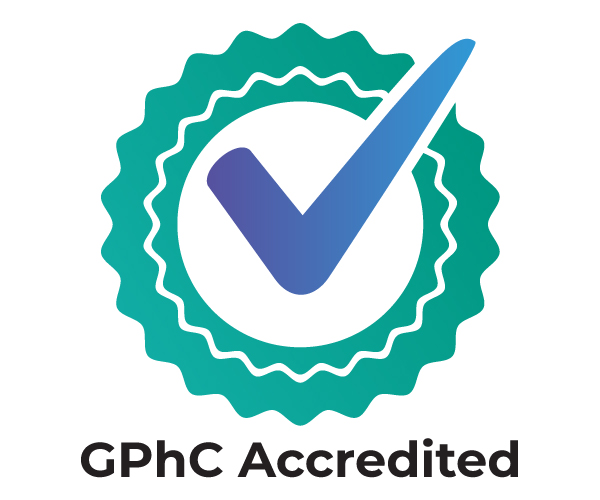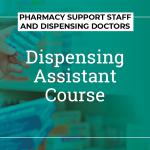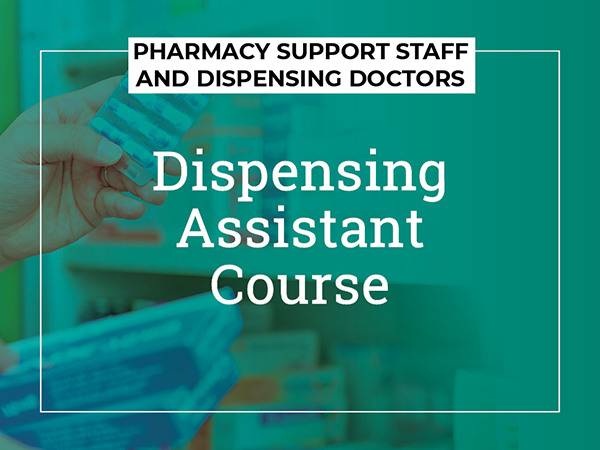Support Staff Course for Pharmacy Healthcare Assistants
The Support Staff Course for Pharmacy Healthcare Assistants takes learners through the practical and legal aspects of working in a dispensary and on the medicines counter. It covers knowledge and skills from both the Support Staff Courses for Dispensing Assistants and Medicines Counter Assistants.
- Develops confidence behind the medicines counter and in the dispensary.
- Provides the appropriate skills and knowledge to prepare for the challenges of both the Dispensing Assistant and Medicines Counter Assistant roles.
Entry Criteria
This course is for those working in a pharmacy in a patient-facing role, both on the medicines counter and in the dispensary. The learner will require a pharmacist or pharmacy technician to act as their workplace training supervisor during the course.
Important Information
We cannot accept applications from self-funded learners. The employer is required to support this programme.
Course Overview
This course meets the GPhC (2020) minimum requirements for the education and training of pharmacy support staff and the following National Occupational Standards:
- PHARM01: Assist with the provision of a pharmacy service
- PHARM04: Provide advice on non-prescribed medicines and products
- PHARM07: Receive prescriptions
- PHARM09: Assemble prescribed items
- PHARM12: Order pharmaceutical stock
- PHARM13: Receive pharmaceutical stock
- PHARM14: Maintain pharmaceutical stock
- PHARM15: Supply pharmaceutical stock
- PHARM32: Assist in the issuing of prescribed items
How is the Course Delivered?
All our courses are delivered by blended learning, via the b-Hive learning system. The course comprises 19 modules, end-of-module quizzes to assess knowledge, Virtual PharmacyTM scenarios to assess competence, activity books and witness testimonies to be signed off by the workplace training supervisor and Final Tests administered under exam conditions.
Support
As well as online access to results and our FAQ section, learners can talk to dedicated tutors year-round, including at evenings and weekends, via our out-of-hours helpline. In addition, learners are supported throughout their course by a workplace training supervisor who is nominated at enrolment to review and invigilate work-based activities and assessments, ensuring the learner is competent in the workplace.
To aid them in this role, the workplace training supervisor will complete a workplace training supervisor course on the b-Hive, to provide them with support and resources to guide and assess their learner(s). They will have access to the b-Hive Learner Analytics dashboard through which they can easily filter and view the progress and expected progress of their learner(s). The dashboard will display real-time data to provide a snapshot of whether a learner is on target or requires further support on a particular area of the course.
Provides an introduction to working in a pharmacy environment. This module covers the key responsibilities with regards to health and safety, SOPs, laws and regulations including information governance, and safeguarding the public including whistleblowing. Learners will be introduced to the requirements of learning and development, and its importance in delivering high quality care to patients.
Learners will understand the roles of the pharmacy team, including the wider multidisciplinary team, and the importance of teamwork, and be introduced to effective communication and customer service. Learners will be introduced to the concept of person-centred care and the communication skills required to deliver high quality care to patients.
This module focuses on the considerations for selling over the counter medicines and providing healthcare advice, including protocols for questioning customers at the medicines counter, the misuse and abuse of over the counter medicines.
This module teaches the knowledge and skills required to accept prescriptions presented to the dispensary and interpret the information on the prescription to ensure it is ready for dispensing.
This module introduces dispensary equipment, resources, calculations and abbreviations which underpin the dispensing processes required to dispense or label prescription items.
This module covers the practical processes and skills required to safely and hygienically dispense a prescription, including the checks each prescription will undergo.
Learners will understand how to order, receive, maintain and supply pharmaceutical stock, along with any administrative tasks associated with these processes.
This module focuses on the additional legislation and procedures required for handling and dispensing controlled drugs safely.
This module teaches the knowledge and skills required to understand the role of the dispensing assistant in issuing prescriptions to patients and communicating effectively with patients regarding their dispensed medicines.
This module is about pain, outlining the common minor ailments causing it, along with drug treatments available to treat it.
This module covers coughs and colds, their symptoms, treatments, the questions to ask and advice you should be giving, as well as reasons to refer.
This module covers gastrointestinal problems, their symptoms, treatments, the questions to ask and advice that should be given, as well as reasons to refer.
This module covers the medicines required by travellers, both to treat and prevent disease.
This module is about problems of the ears, eyes and mouth, their symptoms, treatments, the questions to ask and advice that should be given, as well as reasons to refer.
This module is about problems associated with skin, hair and feet, their symptoms, treatments, the questions to ask and advice that should be given, as well as reasons to refer.
This module covers some minor ailments suffered by specific genders, how to treat them effectively and when to refer.
The medicines counter assistant has an important role to play in promoting wellbeing and healthy lifestyles to the public. This module covers some of the healthy messages and advice that should be given to patients.
This module introduces the concept of clinical governance within dispensaries, including error monitoring, error reduction, audits, information governance and quality payments.
This module explores the services offered by pharmacies and other healthcare providers, to improve patient access to medicines, screening services and advice, and how the dispensing assistant can support the wider team with this.










